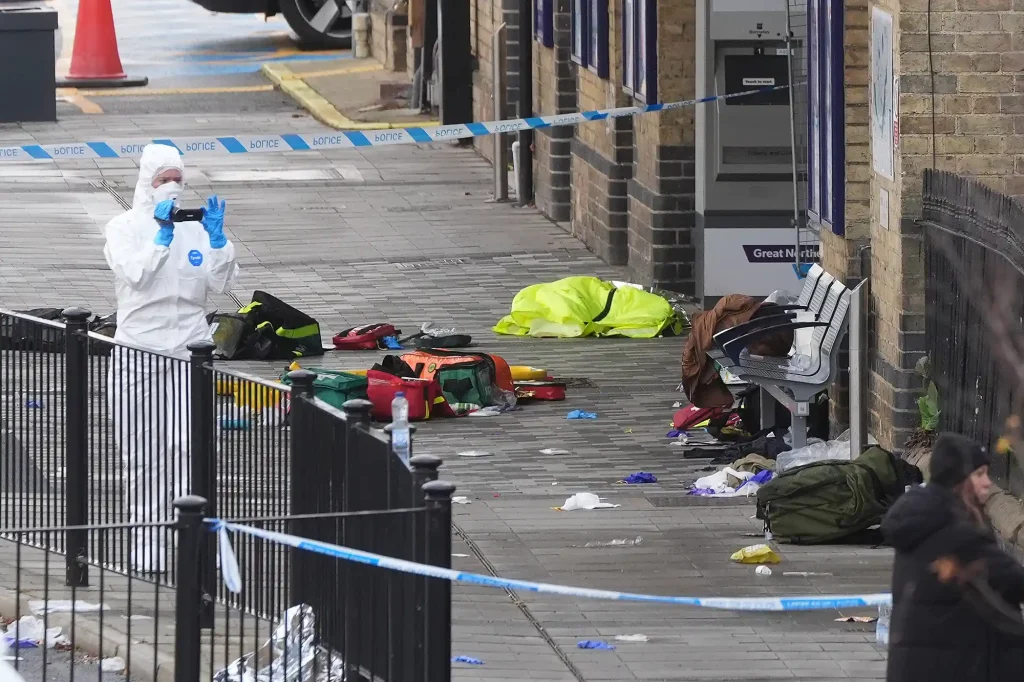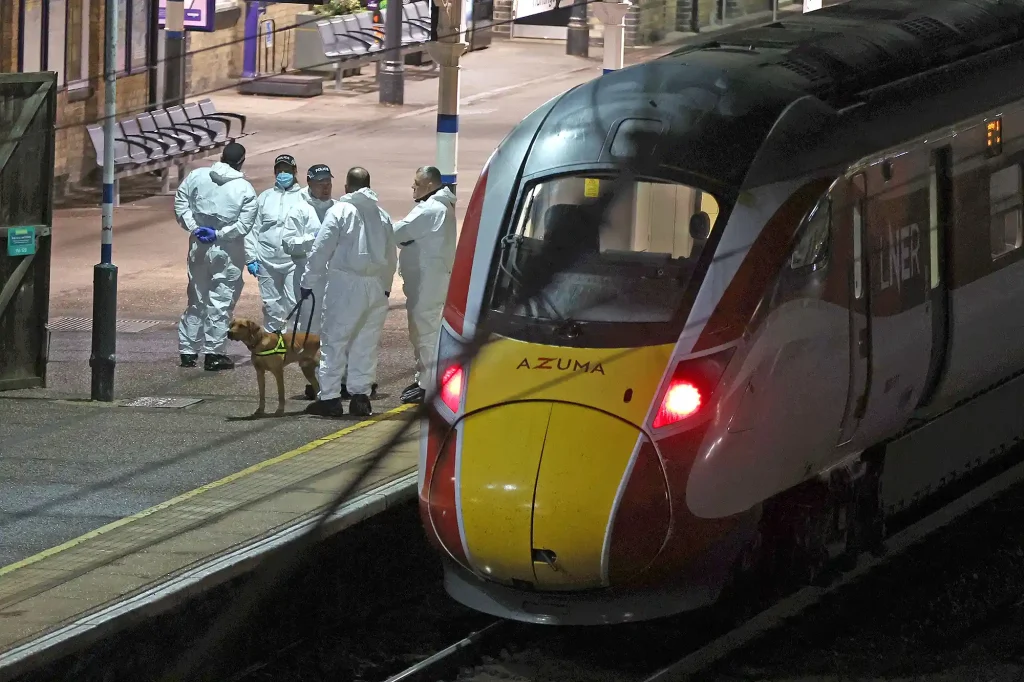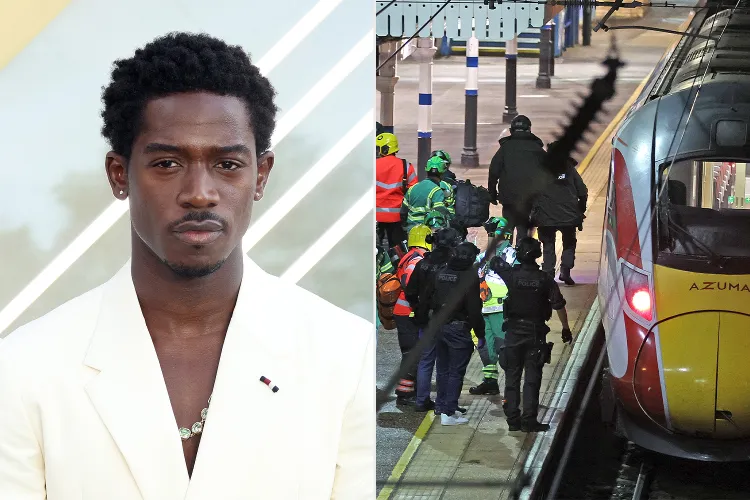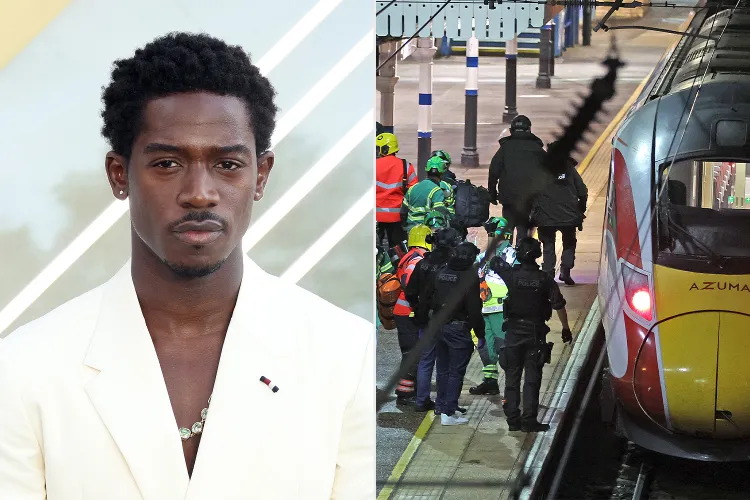Hollywood Star Damson Idris Faces Family Tragedy as His 17-Year-Old Nephew, Isaiah Ishmael Idris, Is Identified Among Victims of Harrowing Knife Attack on UK Train Network
In the early hours of November 1, 2025, tragedy struck a London rail network and sent shockwaves through the family of acclaimed British actor Damson Idris. His 17-year-old nephew, Isaiah Ishmael Idris, was confirmed by authorities as one of the youngest victims of a brutal mass‐stabbing incident on board a train bound for London’s King’s Cross station and on a linked platform attack in east London. The youth survived, but his facial injuries and the trauma of the event have left a family in pain, and a country asking how a routine journey turned so violently unpredictable.

Isaiah was travelling on the east London section of the network — the Docklands Light Railway (DLR) — when the first knife attack unfolded. According to the British Transport Police (BTP), the teenager suffered “facial injuries” in the incident. He is reported to have staggered off the train at Pontoon Dock station and dialled 999, Britain’s emergency number, for help. Meanwhile, hours later on a separate train — an LNER service from Doncaster to London King’s Cross — multiple stabbings occurred, part of what’s now under investigation as a major rail-network incident.
The suspect, identified as 32-year-old Anthony Williams, has since been charged with multiple counts of attempted murder in connection with the spate of attacks. According to reports, Williams is accused of boarding the LNER train at Peterborough before launching the assault just minutes after departure. The sequence of events triggered a major investigation by the BTP and the Cambridgeshire Constabulary, which has stressed that although the attacker appears to have acted alone, the scale of the incident is deeply troubling.
For the Idris family, the news hits deeply hard. Damson, who achieved broader recognition for his role as Franklin Saint in the acclaimed series Snowfall and has since appeared in major film projects, now faces an entirely different kind of spotlight — one of anguish, shock and upright resilience. While Damson has not issued a public comment, his uncle Habeeb Idris confirmed Isaiah’s involvement. “I am aware that Isaiah was involved in the incident on a train, but we are dealing with this privately as a family,” he told the media.

In the days following the attacks, officials confirmed that at least ten people were injured. Seven victims have since been discharged from hospital, but one train-staff member remains in stable but critical condition, and three others are still receiving care. The nature of the injuries, mostly stab wounds, left the public shaken and raised fresh questions about safety on public transport in the U.K.
Isaiah, an A-level student, was simply travelling as a commuter — like many young people in London. And yet in a moment, his routine journey turned into a violent ordeal. Reports indicate he survived by instinctively leaving the train at Pontoon Dock station and calling for help. That quick action likely prevented far worse outcomes. He is now expected to undergo treatment and recovery for the injuries sustained to his face — a deeply personal and visible trauma, one that children and youth ideally should never face.
It remains unclear to the public exactly what led to the attacker’s choice of victims, and officials insist there is no evidence of a terrorist motive. Nevertheless, the scale of the violence — occurring on two separate rail-based locations within hours — has prompted an outpouring of concern from transport unions, safety experts and everyday commuters alike. The BTP has responded with increased policing across the rail network, reassuring passengers while emphasising continued vigilance.
For Damson Idris, this incident is intimately personal. He is more than a global star — he is a brother, uncle, and member of a family grappling with trauma. The young actor, born in Peckham, London and raised in a large family, has often spoken of his grounded upbringing and tight-knit kin. Now, his public persona intersects with private grief: the relief that his nephew survived, and the recognition that life will now, for all of them, be irrevocably altered. The media spotlight on the family, while unavoidable, adds a further challenge: balancing public empathy with private healing.

Within the wider narrative, the stabbing raises broader societal questions. Public transport systems are meant to be safe spaces — corridors for daily life, work and education. When those spaces become sites of violence, the ripple effect is enormous. It’s matched by the trauma felt by injured passengers, the families waiting in hospital corridors, and rail employees whose sense of security is fractured. The emotional toll can be profound. For Isaiah and his loved ones, the road ahead may include psychological recovery and adjustment, beyond the physical healing.
In that light, the Idris family’s choice to deal privately is entirely understandable. They have asked for respect and space as Isaiah recovers; the nature of his injuries, and their emotional impact, demands sensitivity. The public can express support — messages have already poured in online for Damson and his family — but the family’s privacy must remain paramount.
The suspect remains in custody, and investigators continue to piece together the timeline of events. Authorities are reviewing previous incidents — including one in September that left a man in Peterborough with facial injuries — to determine whether they are linked to the same individual or pattern. These inquiries underscore the seriousness of the case and the urgency of safeguarding rail travellers.
In the meantime, the wider public remains anxious. Commuters who board trains each day, often without a second thought, now face a heightened awareness of vulnerability. The BTP’s increased presence is welcome, but the incident has already shaken confidence. The narrative of safety and routine commuting has been disrupted, replaced with a sobering reminder: everyday journeys can, in certain moments, turn extraordinary in all the worst ways.
For Isaiah, the journey ahead will not only be about healing his wounds but reclaiming a sense of normalcy. At 17, he is on the cusp of adulthood — exams, friendships, future dreams all lie ahead. This incident will become part of his story, but it does not have to define his life. With family by his side, including a supportive uncle in Damson and the broader Idris clan, his resilience and care will be his foundation.
The story of one young man attacked on a train may seem like one among many headlines, but for the Idris family it is deeply intimate. It is a moment of fear, of crisis, of survival. It is also a moment of hope — hope that recovery will come, that healing will mend not just physical injuries but the emotional shock of sudden violence.
As the rail network returns to its rhythms and commuters resume familiar patterns, the echoes of that night will linger. For Damson, a star navigating the demands of fame, the incident serves as a reminder of what matters most: family, safety, the fragile normal that we often take for granted. His nephew’s survival is nothing short of fortunate in such a chaotic event, but the scars — seen and unseen — will take time to fade.
In the wider public sphere, this episode highlights the vital need for vigilance, for robust security on public transport, and for kindness to those who emerge from trauma. Families like the Idrises deserve society’s compassion, not just as they navigate the immediate aftermath, but as they rebuild. As Isaiah recovers, as Damson and his family heal in their own way, the hope remains that this act of violence will become a catalyst for greater awareness, stronger preventive measures and a reaffirmation of the safe spaces our communities deserve.
The narrative is still unfolding: charges, court proceedings, investigations will fill future headlines. But in the quiet corners of the Idris family home, the focus is not headlines or careers — it is on a nephew who was once boarding a train, a teenager whose life changed in a matter of minutes. It is on the tender act of protecting, supporting and loving him through recovery. And it is a reminder to all of us that behind every news story lies a family, and behind every survivor, a future waiting to be reclaimed.


